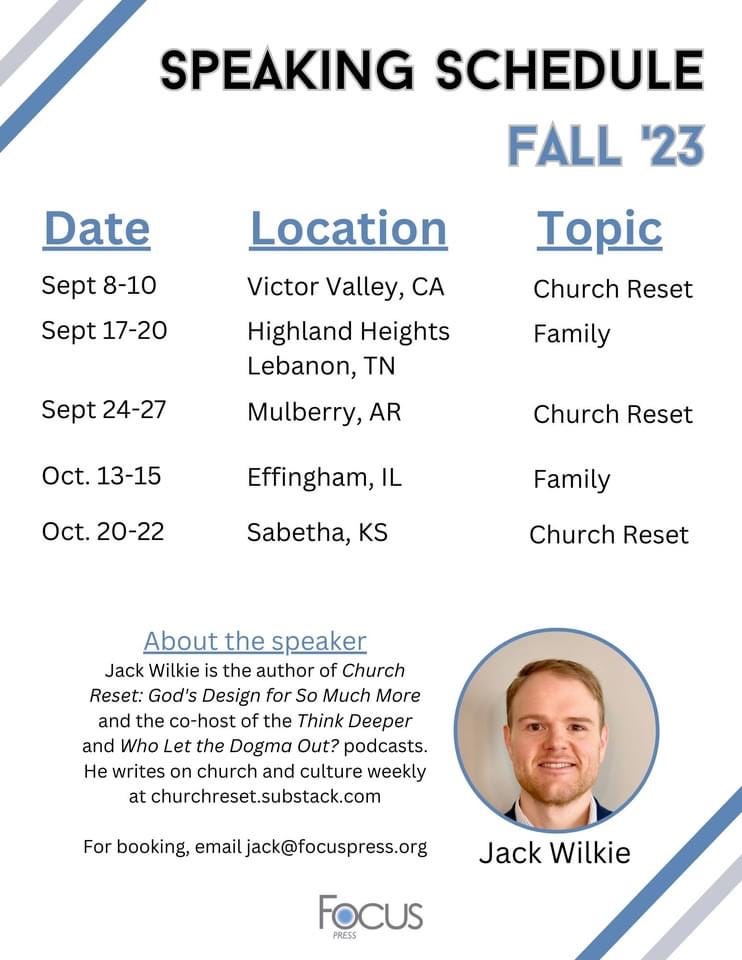A Hopeful Path Forward
What it's going to take
This is the conclusion of a three part series that got sidelined for a bit thanks to the Barbie/feminism series and other pressing concerns. Following this piece, premium articles will be excerpts and drafts from ‘Becoming a People,’ my follow-up book to ‘Church Reset.’
To briefly recap, in part one of this series we looked at how we are not the fully-autonomous individualists we think we are. What we do, think, and say are heavily the result of cultural influence.
In part two we examined how our beliefs and values are far more emotion- and society-driven than we think.
If we are going to bring about the change we want to see in our churches and culture, we have to acknowledge these realities and leverage them to our advantage.
How?
There are many ways we could go with this article, but I will stick to just one—greener grass.
You know, as in the old phrase “the grass is always greener on the other side of the fence.” The world and nominal Christians think the grass is actually greener on Satan’s side of the fence. It’s a happier life filled with all the fun Christians can’t have. At least that’s what they think.
So we assume people really, really love their grass. Therefore we have to find a way to make our grass look and taste like theirs, or extend our fence around them so they can stay right on top of the grass they occupy and still be considered Christians.
Wake up, man. Their grass is killing them.
Society-wide, mental health is a train wreck. Healthy homes are vanishing by the generation. The economy is bad. The country’s future looks bleak. Robbed of our morality and humanity, people have no grounding in anything. Like Eve with the fruit in the garden, they thought all that grass would fulfill them. Instead it’s left them emaciated and on death’s door.
Yeah, they’re posting on social media about how great their lives are. And a lot of Christians buy it, either quietly longing to be in those shoes or scheming to find a way to bring those people in without asking them to change too much. The truth is, they are miserable. Their grass is poisoned.
But if when they look over the fence they see a group of people as miserable, “broken,” and purposeless as they are, we’d be…
well, we’d be as feckless and uninspiring as we are right this minute.
We must be holy and righteous. Trying to be just like them and refusing to live by the book makes our grass just as dead as theirs. Our marriages, to give one example, should follow the Biblical pattern and show them what they are missing out on by doing it their own way.
We must look the part. “Our theology comes out of our fingertips,” as one writer said. A group of Christians and a random collection of people rounded up from a bar, a Walmart, or a football game should be just about instantly distinguishable, and more so every 5 minutes you spend them.
We must be a true family. In one of the loneliest times in history, we should be the place where loving relationships are found.
We must be joy-filled. This doesn’t mean we wear constant fake smiles. It means we carry an unshakeableness into all of life’s circumstances because we are grounded in the God who is there.
It is so good to be a Christian. Do not ever forget that. If we plant our flag on how being a Christian is radically different than what the world offers and unfathomably better, we’ve got some eye-catching, head-turning green grass.
This is how we leverage the two truths about the human psyche we examined in the first two installments of this series.
As people who are heavily swayed by cultural influences, any momentum off of the sinking ship into a better life will catch their attention. Seeing a true, viable alternative helps them see they have options.
And as they are “driven by the elephant,” we can create severe cognitive dissonance in them. Their head says Christianity is vindictive and controlling. Their hearts will see a community of happy, loved, well-adjusted, thriving people who possess a joy they couldn’t fathom.
Some will be hardened by this like Pharaoh and double down on their rebellion. Others will start to wander over to the fence line for a closer look.
In short, the only way to fight a diseased culture is with a healthy counter culture.
Think about how you’ve seen greener grass sway the population before:
President Obama’s meteoric rise in 2008 came with the backdrop of a poster of his face with the word HOPE emblazoned on the bottom. President Trump came to power with the promise to “Make America Great Again.”
No, we aren’t running a political campaign. But we can learn the obvious lesson here—people are looking for something better.
As it turns out, we have something better. We just have to believe in it and unashamedly cultivate it.
Notes:
Here’s where I’ll be this fall - come on out if you’re nearby!
And, I’m booking for Spring - email jack@focuspress.org for info



